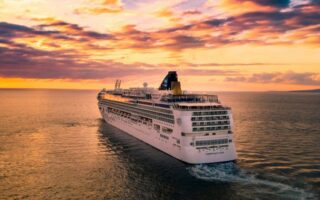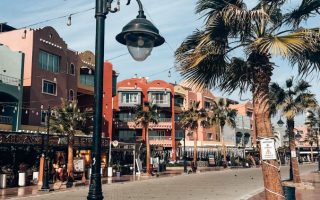The winter sun hung high over Hurghada as we climbed into the back seats of his taxi. He didn’t introduce himself. Perhaps he thought it wasn’t important, or maybe it was just a habit. But he did proudly mention that he was the only taxi driver from our hotel who was born and raised in this coastal city.
“Guess how many drivers here are from Hurghada?” he asked. Without waiting for a response, he answered, “Just me. Most come from cities like Cairo and Luxor, but I grew up here. My parents grew up here. My grandparents grew up here.”
I’m ashamed to admit I didn’t think much of it then. In a tourist-heavy resort like Hurghada, it wasn’t uncommon for Egyptians from other cities to travel here for work.
We’d asked him to take us to Hurghada Marina, expecting a quick ride and maybe a tip on where to grab a drink. What we received, instead, was a history lesson – part personal, part communal, and delivered in English so fluent that it felt almost out of place.
A self-taught storyteller
He shook his head when we asked if he learned English in school. “No, no. They didn’t teach that when I was a child. I taught myself through my passengers. I listen, I pay attention, and I try. I can speak German too.”
A beaming smile painted across his face as we complimented his English. He thought we were just being kind, but we were beyond impressed. For a man with no formal training, his self-taught fluency was remarkable.
For a man without a name, he had an endless number of stories.
“I taught myself through my passengers. I listen, I pay attention, and I try.”
In memory of a fishing village
Driving to the marina, he reminisced about the Hurghada he once knew: a quiet fishing village before the luxury hotels and tourism. “Imagine this being your view your whole life,” he said, gesturing to the sparkling blues of the Red Sea through the window. “The rich people came and built the hotels. Most locals can’t afford to live here anymore. You have to have a lot of money.”
He motioned vaguely at the road ahead, lined with pristine white resorts and sleek modern restaurants. This was the first time I felt a pang of guilt for being a tourist, as though I’d played a part in displacing the people who called this place home.
“We need tourism to survive in Hurghada. But the people who built these areas also took a lot,” he said. His voice was calm, but there was a weight to his words.

He slowed as we approached a circular building overlooking the sea. Despite not knowing anything about it, I immediately felt the gravity of its history. I was connected to its emptiness, as though I could mourn what once was. “This was one of Hurghada’s first hotels, The Sheraton.”
The building stood derelict, a hauntingly beautiful relic of the past, as I felt the driver’s passion while sharing its story. Blending dazzling memories with tales of shady dealings and wealthy investors, I couldn’t verify everything he said, but his conviction made it clear that this history mattered to him. “I promised I would tell its story,” he said as we drove away, “so I will always tell my passengers the history of this hotel.”
“Tourism helps us survive in Hurghada. But the people who built these areas also took a lot.”
A forgotten restaurant in Hurghada’s old marina
Shortly after, he pulled over. “I want to show you something,” he said as we stepped out of the car and followed him towards the bay’s edge. What graced our eyes was one of the most beautiful views I’d seen. The feeling of tranquillity washed over me as we appreciated the azure waters that stretched endlessly.
“Before the new marina was built, this was the best restaurant,” he said. “Everyone came, mainly for this view, but they had to close.”
The restaurant still stood in pride despite its crumbling walls and broken signs. I couldn’t understand how such a breathtaking location had fallen into disrepair. My content-marketing mind raced with ideas to revive the place, but the driver’s explanations grounded me. The opening of the new marina in 2008, the death of the owner, and the shifting tides of tourism all played a part in the restaurant’s demise in Hurghada.
The hidden Hurghada: Old Town

We did visit the new marina, but that’s not where this story ends. While the marina offered exceptional hospitality and picture-perfect views, I wanted to know more about the Hurghada that tourists don’t see.
The driver offered us a detour. “I live in the old town,” he said. With a small laugh, he continued, “The rich live in the new areas, the poor live in the old areas. I am considered poor.”
After confirming that we were happy to stray off the beaten path and away from typical tour routes, we approached the narrow, windy streets. “The shop owners here are desperate for business. You’re welcome to walk, but you might feel like you have to buy something,” he explained as we decided to stay in the car.
The contrast was shocking. A herd of goats stood tied together on a street corner as their urine streamed toward a neighbouring fruit stall. Barefoot children paused their games in the dust to watch us pass by. Families sat on pavements, selling old souvenirs to an audience that might never arrive.
We passed a mosque – beautiful but far simpler than the grand mosques in the tourist areas. Stray cats scavenged through the bins that had fallen into the rubble of abandoned buildings. “Financial struggles and family disputes,” the driver explained, “that’s why the buildings have been left.”
This side of the city felt like a place suspended in time, where life continued in the shadow of Hurghada’s glittering resorts.
Hurghada’s tourism decline and struggling recovery
Before this journey, I had assumed that the plethora of empty hotels and unfinished buildings near my resort would soon be opened. The driver explained this wasn’t the case, with buildings being left for eight years.
“Visitors would buy houses and hotels in Hurghada. When tourists no longer came, builders had to stop working and building the homes. Hundreds of hotels were forced to close as they had no guests.”
He described the long years of struggle in Hurghada – the crash, flight bans, the Coronavirus pandemic, and the global cost-of-living crisis. “Tourism is picking up again now,” he said. “But people don’t spend money like they used to. They’re careful now.”
Until that moment, it hadn’t occurred to me how deeply our economy affects lives so far away. This driver, working for a hotel where his entire monthly paycheck was less than one night’s stay, would rely on tips to support his family while barely getting by. This driver, who has never left Hurghada, felt the impact of international struggles before most of us even noticed.
Dreams in the rearview mirror
As our journey came to an end, he shared one last story. A yellow taxi sped past us, his tone softened, and he said, “I’d love to own one of those taxis, it’s been my dream since I was 18, but I won’t get there now.”
When we asked why, he explained the cost: the equivalent of £25,000 for the car and taxi plate. For him, it might as well have been a million. The vehicle he was driving belonged to the hotel. He couldn’t use it outside of work, as every mile was monitored. He commuted to his 14+ hour shift each day by a communal minibus.
As unfinished buildings blurred past, it struck me that he was just one of many in Hurghada – part of the unseen background of a city shaped by tourism.
And despite all the stories we shared, we never exchanged names. Perhaps he thought it didn’t matter.
Hurghada, Egypt: A city of contradictions
Back at the hotel, slipping back into the comfort of tourism was easy. The entertainment team was lively, laughter filled the air, and the Red Sea sparkled as if untouched. But his stories lingered.
Hurghada is a city of contradictions. It is breathtaking, beautiful, and an incredibly popular destination for those seeking an all-inclusive getaway. But it’s also complex, bittersweet, and plagued by the whispers of untold stories. Tourism has built it, transformed it, and sustained it. Yet, tourism has also pushed its people to the edges.
So, when you visit Hurghada, remember the driver without a name. Generously tip the people who serve you, get to know their stories, and take a moment to see the city for what it truly is – a place of hope and hardship where every gesture of kindness can make a difference.




